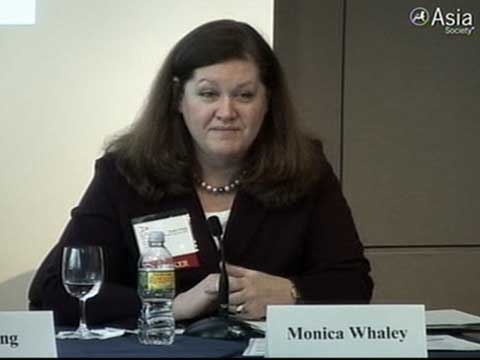APEC: 'The World Looks to Asia for Economic Recovery'

NEW YORK, December 1, 2009 – Accelerating regional economic integration, supporting trading systems and positioning the Asia-Pacific region for sustainable economic recovery were issues that dominated the agenda of the 2009 APEC summit in Singapore.
For the tenth consecutive year, the Asia Society in collaboration with the National Center for APEC, held a post-APEC briefing to review the issues discussed and what they mean for the region’s future. “The world looks to Asia for important growth that will be the engine for pulling the global economy out of the recession," said Asia Society trustee Lulu Wang, highlighting the importance of the annual summit.
The two panels at the briefing, which were moderated by National Center for APEC President Monica Whaley, focused on government and policy issues, and specific sectoral developments in areas such as financial services, health/life sciences and innovation.
According to Sharon Chan, first secretary (political/economic affairs) at the Embassy of Singapore to the United States, that United States' active participation in the summit was an encouraging sign, pointing out that other APEC economies were glad to hear “that America is truly back and ready to engage.”
Japanese representation Shinichi Nishimiya, consul general of Japan in New York, confirmed that his country aimed at pursuing the overarching themes of the Singapore Summit and that preliminary discussions on APEC 2010 were well underway. US representative Kurt Tong, senior official, Asian-Pacific Economic Cooperation, called the Asia Pacific region as being “the potential engine of growth” for the US economy. He emphasized that trade with Asia was imperative for steady recovery and stability of the US economy. “Export equals jobs equal economic recovery," he said. "That is the key point.”
At the industry-focused panel—which also featured Laura Hudson, manager, International Government Affairs, Chevron; Susan Greenwell, VP, International Government Relations; Dereck Berlin, VP of International Government Relations, JP Morgan Chase—Joseph Alhadeff, Chief Privacy Officer, VP Global Public Policy, Oracle Corporation, enumerated the six key areas, or six "I's", that would promote the use and development of information and communications technologies (ICTs) as catalysts for economic growth: Infrastructure, Innovation, Information flows, Intellectual capacity, Investment and Integration.
Reported by Ayesha Sikander
